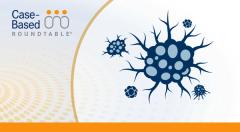
Patient Selection for Imetelstat Benefits From Considering AEs
Abdulraheem Yacoub, MD, discusses the adverse event profile of imetelstat when treating patients with myelodysplastic syndromes.
Episodes in this series

Abdulraheem Yacoub, MD, professor of Hematologic Malignancies and Cellular Therapeutics at the University of Kansas Medical Center, discusses the adverse event (AE) profile of imetelstat (Rytelo) when treating patients with myelodysplastic syndromes (MDS).
The phase 3 IMerge trial (NCT02598661) led to this drug’s approval in patients with low- and intermediate-1 risk MDS and transfusion-dependent anemia requiring 4 or more red blood cell units over 8 weeks. They also had to receive prior erythropoiesis-stimulating agents. Yacoub says the AEs that stand out are cytopenias including considerable rates of grade 3 or higher thrombocytopenia and neutropenia. In addition to monitoring these toxicities closely and providing support when these AEs arise, he says patients should be selected to receive imetelstat only if they have sufficient reserves of platelets and neutrophils before treatment, making the therapy ideal for only certain patients.
There were also treatment-emergent nonhematologic AEs such as arthralgia/myalgia, headache, and fatigue, but few were grade 3 or higher. According to Yacoub, hematologists will generally be comfortable managing the other toxicities, but patient selection and close support are essential to address the hematologic AEs.
TRANSCRIPTION
0:10 | This is a new drug that we're going to be learning [about], and obviously we have to build our own expertise and how we address those [AEs]. But the ones that stand out is the impact on blood counts. Imetelstat can cause significant thrombocytopenia and significant neutropenia, so we start with selecting patients who have some reserve in their platelet counts and their hemoglobin and their neutrophil count. That it is not a drug for everybody; it's a drug for select patients who have otherwise preserved platelets and neutrophils, and then meticulous follow-up for the platelet counts and the neutrophils and supporting patients accordingly. There are nonhematologic [AEs] as well that we probably will have to learn to manage as we go forward, but many of them are not prohibitive, and things that we are very comfortable addressing. I think the hematological [AEs] remain the most visible challenge that require the skills of the hematologists in delivering the therapy safely for the right subject.















































